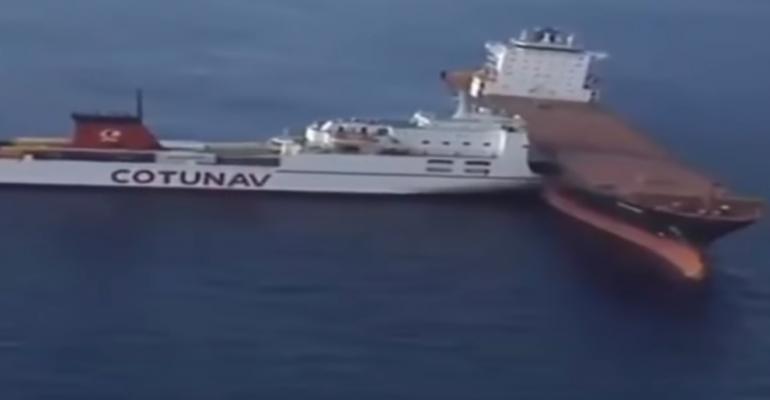One is constantly warned not to prematurely speculate in such cases, urged to await the results of the casualty investigation. This is often a futile exercise, as some flag states are so useless and inert that there is no proper investigation and if there is, it is buried for years or lost in translation. With an incident as spectacular and photogenic as this one, who would not want to guess the reasons for this lapse. So here goes!
Maritime law is sometimes very curious, but it is difficult to imagine that much of the blame for the collision will adhere to those aboard the container ship. Maybe the chap keeping the anchor watch should have screamed over the VHF, sounded the siren or fired rockets, as the ferry charged down on the hapless anchored vessel, but there would have been very little else available to mitigate the oncoming disaster.
Gone for a cup of tea?
So, what on earth was going on aboard the Tunisian ferry? It is probable that the ship was following a computerised track on an electronic chart, with nobody on the wheel. Perhaps the look-out had been sent below to have breakfast, or have a cup of tea, or to wake the cook. What might the officer of the watch have been doing? Was he (or she) dazzled by the beams of the rising sun on the eastern horizon? Was he engaged in a particularly difficult Sudoku puzzle to alleviate his boredom? Perhaps he was chatting to his nearest and dearest on his smartphone?
Might the OOW have been distracted by having to complete the garbage disposal form (six copies) before the ship’s arrival, or some other administrative burden? Or with the lookout away and the bridge mercifully quiet, the posture-perfect chair comfortable, and the steady hum of machinery, did the watchkeeper just fall, briefly but critically, into the arms of Morpheus?
It would not be even remotely strange if one of these reasons was discovered as the prime cause of the collision, because all of these silly reasons and more have already contributed to one or more instances of accidents attributable to navigation. Who recalls the OOW who claimed that he had arisen from his chair to alter course, caught his trousers in its footrest and laid himself out, lying unconscious on the console, while his ship sped to its doom on the rugged coast of Cornwall?
The curse of communication
There has been any number of accidents attributed to the sophistication of the navigation equipment, rendering the OOW almost, but alas, not quite, pointless. Others blamed on the curse of communication. A notably choice case was that of a chemical tanker, being conned by her master, who was shouting with rage into his mobile, oblivious to the entreaties of his watch officer telling him he was leaving the channel. Or the wretched overworked supply boat master trying to leave port in fog, communicating on his VHF and two mobiles simultaneously, but missing the one important message from the VTS telling him he was about to crash into the breakwater.
Join the Smart Shipping debate at Seatrade Maritime Middle East
Technology itself has been blamed for many more than one total loss and lots of serious damage. If electronic navigation hadn’t been invented, it would have been unlikely that a hapless navigator would have laid his course on a paper chart, right into an island, while managing to edit out the land on his ECDIS. But there again (and here we might just possibly return to the sad case of our Tunisian ro-ro), if ship’s officers felt a bit more engaged and useful, and not merely there to oversee the clever equipment, they might have a bit more interest and pride in their work. Discuss.
Copyright © 2024. All rights reserved. Seatrade, a trading name of Informa Markets (UK) Limited. Add Seatrade Maritime News to your Google News feed.


